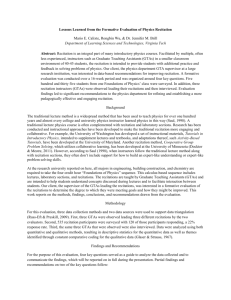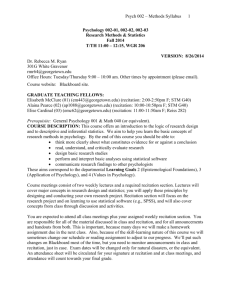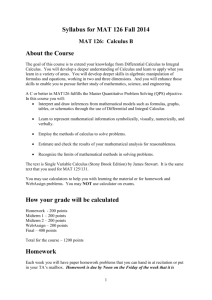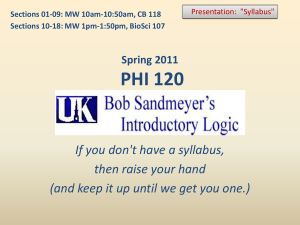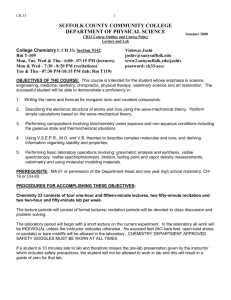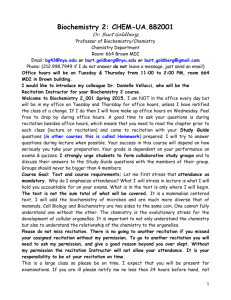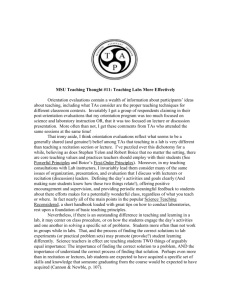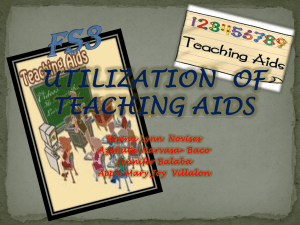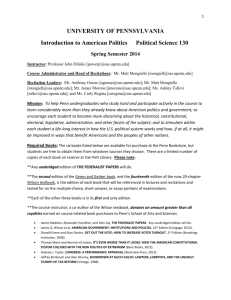Z422SYL.F94 - College of Computer, Mathematical & Physical
advertisement
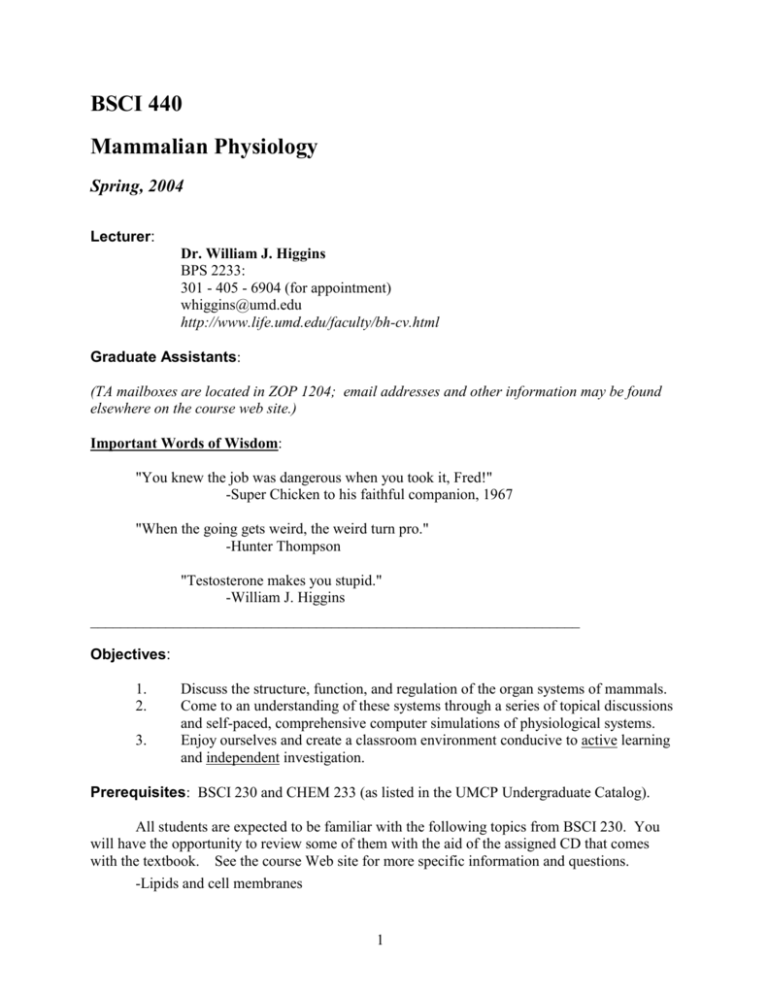
BSCI 440 Mammalian Physiology Spring, 2004 Lecturer: Dr. William J. Higgins BPS 2233: 301 - 405 - 6904 (for appointment) whiggins@umd.edu http://www.life.umd.edu/faculty/bh-cv.html Graduate Assistants: (TA mailboxes are located in ZOP 1204; email addresses and other information may be found elsewhere on the course web site.) Important Words of Wisdom: "You knew the job was dangerous when you took it, Fred!" -Super Chicken to his faithful companion, 1967 "When the going gets weird, the weird turn pro." -Hunter Thompson "Testosterone makes you stupid." -William J. Higgins _________________________________________________________________ Objectives: 1. 2. 3. Discuss the structure, function, and regulation of the organ systems of mammals. Come to an understanding of these systems through a series of topical discussions and self-paced, comprehensive computer simulations of physiological systems. Enjoy ourselves and create a classroom environment conducive to active learning and independent investigation. Prerequisites: BSCI 230 and CHEM 233 (as listed in the UMCP Undergraduate Catalog). All students are expected to be familiar with the following topics from BSCI 230. You will have the opportunity to review some of them with the aid of the assigned CD that comes with the textbook. See the course Web site for more specific information and questions. -Lipids and cell membranes 1 -Membrane permeability and transport Please note that these topics are also -Osmotic pressure all covered in unassigned sections of -Muscle contraction your textbook. -Membrane potentials and action potentials Lecture: Monday, Wednesday, and Friday @ 9:00 A.M. in HJP 0226 Lecture outlines and notes are available on the course Web site. You should download and print the notes and refer to them in lecture. Lecture Schedule: Please see the course Web site for a complete listing of lecture topics and assigned readings. Note that there are no dates assigned to the lecture topics or readings from the textbook. For any listed topic, we will get there when we get there. No deadlines, no schedules. Please bring a sign (half of a file folder is a good size) with your first name in LARGE letters on it to class. Hold it up when you ask a question or speak to Dr. Know-It-All. He will then get to know your name which is important!!!! Textbook: Germann, W. J. and C. L. Stanfield (2001) Principles of Human Physiology. First Edition, Benjamin/Cummings, San Francisco. Please note that you WILL use the CD that comes in this book. Reference Textbook: The following textbook will be available in the recitation room. It is NOT required but may be used as a supplemental reference or as a substitute text. Silverthorn, D. U. (2001) Human Physiology, an Integrated Approach. Third Edition, Prentice Hall, Upper Saddle River, NJ. Email Reflector & WWW Pages: Every member of the class is expected to have and use an email account. The address for this account must be the one listed in the University database. Students may email questions to Dr. Know-It-All. He will reply either to the individual student or, if appropriate, to the entire class via the class email reflector. Thus all questions and comments are first screened by the instructor before they are sent to the entire class. Students may not send items to the class reflector. You will also have access to a Web site for your individual recitation section. This site will be posted via the Web CT platform. It will used for communication among memebers of your recitation group and will also allow you to check your grades! Stay tuned for access information. We also have BSCI 440 and 441 home pages on the World Wide Web. This allows us to post graphical images, lecture notes, sample questions, etc. This Web page can be accessed from the College of Life Sciences home page or go directly to: 2 http://www.life.umd.edu/classroom/bsci440/higgins ***************************************************************** Examinations: Three hourly examinations will be given in class on: - Monday, 23 February (Lectures 1 – 11: 150 points) - Wednesday, 31 March (Lectures 12 – 23: 200 points) - Monday, 26 April (Lectures 24 – 35: 200 points) These dates are fixed and will not be changed. Sample examinations from previous semesters are posted on the Web. The cumulative final examination (250 points) has been scheduled by the University for: Monday, 17 May, 8:00 - 10:00 AM in HJP 0226 Material from lectures and recitation will be included in all examinations. Regrade Policy: The grading of an examination may be discussed with Dr. Higgins within 10 (ten) days of its return to you after you have checked the posted answer key. He will not consider answers that were misinterpreted by the grader due to sloppy handwriting, poor organization, or incorrect terminology. Your answers must be clear and concise the first time. A general plea for help, a review of the entire exam, or a nonspecific request will not be honored. You must complete all examinations in ink if you wish to discuss a possible grade change with the staff. Make-Up Examinations: Do not miss an examination for any reason other than a serious medical or personal problem! Please refer to the current edition of the UMCP Undergraduate Catalog for policies and procedures. These regulations (including the requirement for documentation) will be strictly enforced. We do check all medical excuses with your physician, so please inform her/him we will be calling to verify any specified illness. A simple note from the University health Center will NOT suffice! If you are well enough to walk there, you can come tot he exam and discuss your illness with Dr. Know-It-All in person. REMEMBER: If you aren't dead yet, show up for the exam. Die later. GRADES: Examinations = 800 points; Recitation = 200 points 3 Course total = 1000 points Grade of A B C D > > > > 900 points 800 points 700 points 600 points ************************************************************************** Your continued enrollment in this course constitutes a binding contract. Therefore, this grading system is hereby agreed to by all course participants. Thus there will be no competition among participants, and final course grades need not and will not be discussed/negotiated. You either have the points or you don't! ************************************************************************** Appointments: Communication is essential: we (the course Staff) must hear your comments, criticisms, questions, etc. We will make an effort to visit the laboratories. Dr. Know-It-All will arrive at the lecture hall by 8:30 AM and is eager to answer your questions. He will usually have some time after lecture to answer your questions. You should plan on using these times to communicate with your professor. We all enjoy hearing from our clients! Your GTAs will also have time to discuss both lecture and laboratory material with you. Just ask, and you shall receive! If the need arises, you may schedule an appointment by calling the number listed above. Please note that our busy teaching schedule and other faculty duties preclude any "drop in" visitors. Do not email Dr. Higgins to request an appointment; call x 5-6904 !! We will always be available via email. Use it, but please keep to topics relevant to the course. Please remember that Dr. Higgins wants to meet and speak with each of you. Come to the lecture hall early and join us for coffee and conversation. Mention your name each time we speak so that Dr. H will get to know you! Recitation: (All recitation sessions held in Room 1121 of Plant Sciences) What is a recitation session? This is a time to re-enforce the lecture material through group discussions, working with computer simulation programs, and by getting all your questions answered. These sessions are designed to optimize your learning process and to help you prepare for exams. You may be provided with study or discussion questions and problems to be discussed during the following week. Please prepare answers ahead of time so that questions and problems may be addressed efficiently. Note that you may be called upon individually to provide answers to these questions and that your answers will count toward your participation grade. Your Teaching Assistant is there to direct and guide the sessions. While they are all knowledgeable, they do not have all of the answers! Plan of referring those tough questions to Dr. KIA in the pre- and post - lecture Q & A sessions! 4 Attendance in recitation sessions is mandatory and participation is rewarded with points that represent 20% of your grade. If you miss a session with a legitimate, documented excuse, you may attend another during that same week but you must make prior arrangements with both your regular T.A. and the T.A. of the session you wish to join. Arriving more than 10 minutes late or leaving before the GTA dismisses the group counts as a missed recitation! Each missed period costs you 15 points. Presentations - Pairs of students are expected to prepare one, 10-15 min. oral presentation on a course related physiology topic. Please not that each pair is expected to sign up during the second week of class for a topic that relates to a specific unit covered in lecture. You will utilize Power Point or some other presentation software. Each pair thus becomes "experts" on that particular topic and may entertain questions from the group. Active discussion and exchange is the goal. Grading will be based on presentation skill and style, but most importantly on content and organization of material. Specifics will be provided by your TA during the first week of recitation. Recitation Grading: Attendance and participation in class discussion as determined by your TA: 40pts. Presentation: 60pts (25 from peer evaluation) Announced Quizzes (6): 120pts (Remember: each missed recitation period costs 15 points.) Schedule: Recitations in general, will follow the lecture topics. The computer work will include simulations on the CD of Muscle, Neuronal, Cardiac, Respiratory and Renal function. You may get assignments or choose to participate in programs that simulate physiological functions using simulation programs found on the recitation room computers. Bring your CD to recitation. A Final (but Important) Note: The entire staff is dedicated to making this course an enjoyable and worthwhile learning experience. We are very concerned about providing a comfortable atmosphere conducive to learning. We expect you to work hard, learn to think critically, and develop self-reliance. However, we are also here to help you and to answer your questions. There is a fine line between hand-holding and helping. We want you to learn to swim on your own but if you feel you are sinking, PLEASE, ask for help. We also want you suggestions for improving the course. Help us to help you by providing questions, criticisms, praise, etc. To do well in this course you should/must: 1. Attend EVERY lecture and recitation meeting. Arrive on time!!! 2. Read assigned chapters. Pay attention to figures and major concepts first, then gather all necessary details. Practice quantitative problems. 5 3. Organize (i.e., RECOPY) your lecture notes. Find and mark the corresponding passages in the text and the relevant questions on examinations from previous years. 4. Re-read the relevant text material and answer the old examination questions. 5. Work through the CDs and answer the questions given on the Web site! 6. Form a study group. Use your recitation time properly. 6



